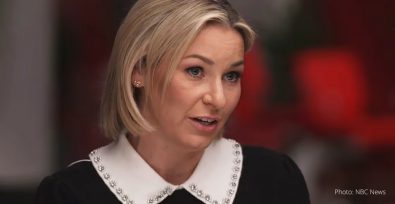At just 11 years old, Brigitte Combs’ mother found her a husband—a 26-year-old man devoted to the Hare Krishna movement. Living in Los Angeles, Combs wasn’t allowed to attend school and was expected to marry young. To Comb’s relief, the man backed out, disturbed by her age. But when Combs was 13, her mother arranged another match—this time to a 37-year-old.
At 14, she was married in a religious ceremony and pregnant shortly after. When she was seven months along, her parents took her to the county courthouse to legalize the marriage. “Do you want to do this?” the judge asked. “You’re both willing?” Combs recalled wanting to scream, “No, no, I don’t. Do something!” But she had no choice but to answer “yes.”
In California, children of any age can marry, “as long as at least one parent and a judge approve,” writes Nicholas Kristof in an opinion piece for The New York Times.
By 17, Combs was raising two children while living trapped on a Hare Krishna farm. “Life was hell,” she said. Lawyers refused to help a child, and even women’s shelters turned her away for being underage. At 18, she ran away and lived on the streets. Two years later, she finally obtained a divorce.
The survivors who lived it
Sheena Renea’s story, too, is a warning. Married at 15 to a 20-year-old in Missouri, she sought safety but found violence. “I wasn’t old enough to get a restraining order; I wasn’t old enough to go into a domestic violence shelter,” she said. “I also wasn’t old enough to get a lawyer.”
When her husband’s abuse escalated, Renea’s despair turned fatal. At 17, Renea’s friends killed her husband, and authorities charged Renea with first-degree murder. She spent 25 years in prison.
I wasn’t old enough to get out of marriage. But I was old enough in the state of Missouri to face the death penalty.
Today, Renea runs Show Me Justice for All, advocating for prison reform and the end of child marriage. “A man lost his life,” she says. “I lost my life in prison. We left an array of victims behind us.”
Why do some states still defend child marriage?
Despite bipartisan progress, resistance persists. Conservative lawmakers often argue that parents should decide, especially within religious communities emphasizing “no sex before marriage.” Some fear that banning underage marriage could lead to more abortions.
On the liberal side, opposition in California has come from branches of Planned Parenthood and the American Civil Liberties Union. In a joint letter, the organizations wrote:
We are concerned that such a ban could drive young people who are already in abusive relationships further underground … [and] about the consequences for those young people who willingly enter a marriage.
To which Kristof counters:
To me, this position veers into liberal self-caricature and underscores how well-meaning people can be out of touch with those they aim to protect. Spend time with girls who have actually been married young, and you don’t find plucky teenagers … you find scared girls pushed into marriages that, researchers have found, disproportionately end in divorce.
Fraidy Reiss, founder of Unchained at Last—and herself a survivor of a forced marriage—called California’s opposition “mind-boggling and devastating.” “It feels like a slap in the face and a stab in the back at the same time,” she said.
Abuse, trafficking, and a legal loophole
Between 2000 and 2021, Unchained at Last found that more than 314,000 minors were married in the United States. About 86% were girls, most aged 16-17, though some were as young as 10. Roughly 66,000 of those marriages would have constituted statutory rape were it not for a marriage license.
Minors in such unions encounter unique barriers: most domestic violence shelters refuse them, courts often block them from filing for divorce or protection orders, and authorities criminalize them as runaways if they flee. “Child marriage is a workaround for statutory rape laws and trafficking laws,” says Reiss.
A 2010 US Senate investigation revealed that immigration authorities had approved more than 8,000 spousal or fiancé visas involving a minor between 2007 and 2017—effectively facilitating the trafficking of underage brides into the country.
The clear path forward
Since 2018, Delaware, Washington, DC, and 15 other states—including New York, Massachusetts, Missouri, Virginia, and Washington—have banned child marriage without exceptions. But 34 states still allow it. Some, like Nevada and Florida, set the minimum age at 17; others allow 15 or 16. And in California, Mississippi, New Mexico, and Oklahoma, there is no minimum age at all.
Kristof writes,
Even as the US government advises other countries to end this cruel practice, at home we preserve what amounts to legally sanctioned statutory rape.
Ending child marriage would not erase family hardship, but it would draw a clear legal line protecting minors from coercion and exploitation. Once a child reaches 18 they are legally independent, better empowered to resist coercion, and entitled to access services such as shelters and legal support.
It’s time for every US state to act. Banning child marriage is not partisan—it’s a matter of human rights. Sign our petition to stop forced child marriage in the US.







Freedom United is interested in hearing from our community and welcomes relevant, informed comments, advice, and insights that advance the conversation around our campaigns and advocacy. We value inclusivity and respect within our community. To be approved, your comments should be civil.
Dear Goving B:
Mencionar que el ex futuro esposo pertenecía a H.K. es necesario, porque en el caso interviene el agravante de una secta, la Asociación Internacional para la Conciencia de Krishna (ISKCON). Y como tal, practica las típicas y archiconocidas técnicas de reforma del pensamiento. La encerraron en una granja. Creo que aquí se trata de casos, no de análisis comparativo.
At the top you mentioned the minor and the identified the Hare Krishna movement as the culprit. Thereafter, you listed a few more such cases but did not identify the religion or ethnicity of the victims. Are you guilty of prejudice against one community and ethnicity ?